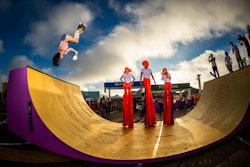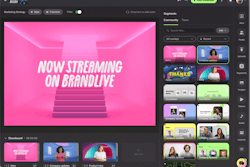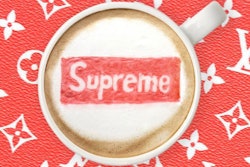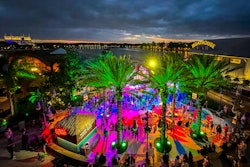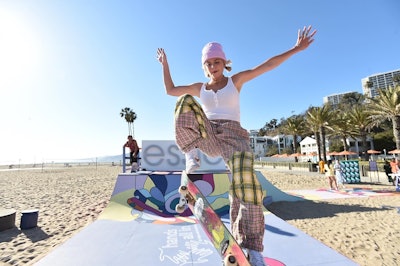
A recent example? OC Ramps made a funky-shaped skatepark for nail polish brand essie. See more: Why Essie Custom-Built a Branded Skatepark on the Beach
OC Ramps was born out of 13-year-old Tyler Large’s desire for a quarterpipe at his house that he and his friends could skate on.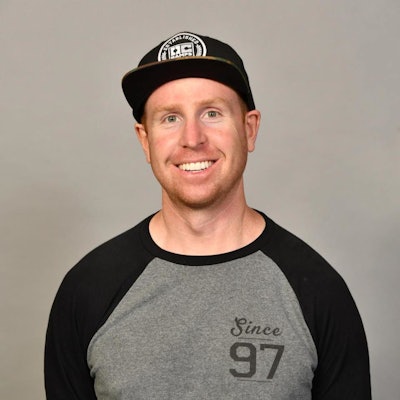 Tyler Large, the president and owner of OC Ramps.Photo: Courtesy of OC Ramps
Tyler Large, the president and owner of OC Ramps.Photo: Courtesy of OC Ramps
“It wasn’t initially intended to be a business,” he said, explaining how he and his dad built an eight-foot-wide and three-foot-tall quarterpipe, so Large and his friends could skate in the backyard and fit the ramp through the side gate of the house for storage.
The original ramp was a great success, and Large carried on building quarterpipes even after his father passed away from terminal brain cancer three years later. In dedication to his dad, Brian Murray Large, he eventually sold quarterpipes to other children in his neighborhood in Huntington Beach, Calif., and—after finishing a degree in economics and getting licensed in general construction, carpentry, and engineering—made OC Ramps the online marketplace it is today.
But aside from building custom ramps for people who want an at-home skatepark, OC Ramps has a hand in the events industry, proving that out-of-the-box activations have the power to engage guests in a way that drives business and creates strong relationships.
Keep scrolling for insight into how unique event offerings are powering the next generation of events, and how to level-up your business—no matter the industry you’re in.
Can you give some background on OC Ramps and its event offerings?
We’re located in Orange County, in Santa Ana, Calif.—right next to DisneyLand! The very first (ramp I built) was in Huntington Beach. Huntington Beach to Santa Ana is 10 miles or so, so the business has always been within the same backyard. We’ve been operating out of here ever since we left my mom’s garage in high school. I moved the business into a tiny warehouse in 2005 in Santa Ana, and we’ve been in this city ever since.
(OC Ramps now operates out of an 8,000-square-foot building on a 20,000-square-foot lot that can be rented as an event venue in itself for corporate events, receptions, private dinner parties, and film productions alike. There’s five varying half pipes on-site ranging from three to seven feet tall and a 20-foot-high platform perfect for a DJ or live entertainment act. OC Ramps’ event mantra: “Let’s make corporate the new cool.”)
We ship all over the United States. We do some international—our No. 1 country that we ship to outside the U.S. would be Canada. Australia is (also) big on skateboarding and Europe. The only downfall with shipping to those locations is the expense, especially right now. Obviously, California is the big state in skate, surf, (and) snowboard culture, but we still ship most of our kits—apart from the West Coast—to the East Coast and New England states.
And because we’re a business that’s not owned by a crazy corporate company, we have the liberty to create products on our own in-house. If someone wants a standard ramp on our website for an event, they could simply look at our website. However, if someone has an idea in their head, such as, “I want this custom mural,” or “I want this ramp custom-branded,” or “I want this skatepark to look like this,” then we have that capability.
We (also) do ramp demos for corporate events and provide the professionals who do the demos. We’re a one-stop shop for skateboarding. Bringing the skateboard vibe is going to surprise people. And it’s true, because it’s something out of the box. An event coordinator could say, “We want a ramp and six professionals,” and we’ll bring everything—from building the ramp to the people skating it.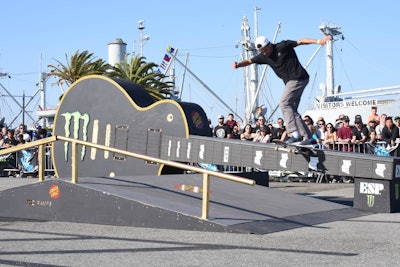 Large recalled "one of the coolest events we ever did," citing a ramp that was a 20-foot, life-size guitar where the neck of the guitar was completely skateable (pictured). OC Ramps built it for 2019's GnarlyTown Festival.Photo: Courtesy of OC Ramps
Large recalled "one of the coolest events we ever did," citing a ramp that was a 20-foot, life-size guitar where the neck of the guitar was completely skateable (pictured). OC Ramps built it for 2019's GnarlyTown Festival.Photo: Courtesy of OC Ramps
Describe your main demographic. How do you target them?
It’s a wide range. A portion of people that typically purchase our ramps are kids—as young as five up to college age. The other portion of our demographic would be the event business. Honestly, the most random businesses are going to want skateboarding at their event just to bring a different attraction, vibe, and ambiance. We have an interest in appealing to corporate planners and event planners. Generally speaking, they’re the ones that have to present these out-of-the-box ideas to their clients, so we want to attract that type of demographic.
On the purchase side of the business—kids who just want to buy a ramp for their house—we try to appeal and attract them through social media and social media marketing. They see our professional skateboarders riding our products, riding our ramps, and, in turn, that pushes sales.
But our social media marketing efforts lead everyone to our website, where we have information about either purchasing or renting a ramp. I would say that the majority of purchases—on both sides of our business—would stem from social media and website presence.
Can you elaborate on your social media marketing strategy?
Just fill it with content.
We work with a lot of photographers and videographers, and the nice thing they always say about our brand is that there’s so much organic content. We don’t need to plan what we’re posting tomorrow or map out the month because we’re so actively busy with custom jobs, demos, and different events.
So, to land the plane, it’s about organic content. As long as our doors are open, we’re going to have professional skateboarders come through here and get clips, we’re going to be doing events and getting clips, and we’re going to be doing custom stuff for clients and getting clips too.
Why was entering the events industry important for your brand?
Internally, (events are) beneficial because they show the diversity of what we’re capable of as a company and as a brand. We’re not just a simple skateboard ramp kit. We’re licensed carpenters and engineers, and I think this proves the level of creativity and the capabilities that we offer.
But we’ve hosted our own events, and we’ve been the client of people hosting events. We’ve learned more from doing our own events here in Santa Ana. Every year, we host a huge Halloween party—we call it “Ramptober”—and we’ve been hosting that since 2008. So every year, we’ll have a different brand perform and we’ll do a different theme. One year, we did '80s night, and another year we did punk rock night.
(We learned that) preparation is the underlying key. It goes back to the basics—preparing the theme, preparing the marketing strategy in advance, and preparing all the staff and the catering. Oh, and the booze. It also ensures we give guests ample time to mark their calendars and get excited.
What’s the payoff of all this preparation that makes an event worth hosting?
For my business in particular, when we host an event, I don’t see the ROI immediately, and I go into hosting our events knowing that. But the other key point is building relationships. For us, at least, building relationships is almost just as important as the ROI.
Building relationships is huge. Let’s say I invite 12 of the world’s top pro skateboarders from X Games, for example. If they come and they invite their professional skateboard buddies, now that 12 has multiplied into 18 or 20. That, now, opens a door for us to establish a relationship with that professional skateboarder and/or their sponsors. So maybe that new relationship has a great role with Red Bull or Monster Energy Drinks—whatever the case may be—and those people are going to need ramps when they’re hosting an event or a skate contest. That’s planting a seed that hopefully turns into fruit later. In terms of ramp sales, it’s not like our website goes gangbusters and we’ve sold a million more units of ramps, so it’s a long-term game.
How does having a unique activation at an event, such as an OC Ramps demo, for example, elevate an event?
I see our presence and the activation we’re putting together helping our clients because it keeps the guests at their party for longer. They’re mesmerized by the skaters and taking photos and videos. The guests are more intrigued, and I think the whole goal for party planners is keeping guests at the event and engaged.
Where do you hope to see OC Ramps in the next 10 years?
We have lots of goals. We hope to certainly grow, and we want to expand our operation into the East Coast. Our next step is to set up an operation on the East Coast to establish a presence there. We’re thinking about Georgia. And because we’re shipping all over the nation, that’ll also help cut down our shipping timeframes. And for shipping over to Europe—the ability to ship out of the Savannah port would be nice and convenient.
Beyond that, we also want to be able to tap into building bigger skateboard parks. Skateboard parks for cities, municipalities, and even skateboard contests. We currently do this already, but we want to elevate into that realm even further.
And then grow our presence online and on social media. Because we work with these professional skateboarders and now that we have a full-time filmer, we’re dedicated to building the brand on social fronts. But the pros and cons of that are that there are so many platforms. Ten-plus years ago it used to be Facebook and Instagram and that was it. But, now we have TikTok, Snapchat, and everything else. It’s important to keep up.
Overall, we just want to grow and continue to enjoy what we do. That’s also important—I don’t want to grow into some massive corporation just to take over the market. We’ve been successful in our business because we’re passionate and enjoy what we do. I don’t want to lose grip of that either.
To new or aspiring business owners and entrepreneurs, what advice can you give that transcends industries?
There would be two points I would say to any business owner or entrepreneur.
One is dedication. I think the problem with social media in this world is there’s a lot of gimmicks where people look for instant pleasure. And that relates to business where people are looking for instant cash or huge funds in the bank account, and most businesses aren’t massively successful overnight, or within a few weeks, or even within the first year. So, dedication is key and staying realistic with it.
The other point I would encourage any entrepreneur or business owner to do is to be resourceful and seek out information. I think that’s another reason why we’ve been successful. I’m not afraid to ask somebody in a particular industry about their challenges and learn of their pitfalls. What’s that saying? “A wise man learns from his mistakes, but a smarter man learns from others’ mistakes.”
For example, when we wanted to go into an online retailer at one point, I met with other businesses that have done that to get their take. And so I think seeking out information—sometimes people might be a little bit timid, shy, or embarrassed—but I think being resourceful is huge.
This interview has been edited and condensed.




